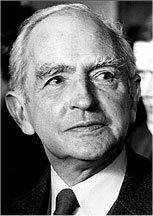In Remembrance: Christopher Fry
 Christopher Fry, the noted playwright who also worked on the
screenplays for several Hollywood epics, has passed away on June 30,
2005 in Chichester, England. He was 97.
Christopher Fry, the noted playwright who also worked on the
screenplays for several Hollywood epics, has passed away on June 30,
2005 in Chichester, England. He was 97.
Born Christopher Harris on December 18, 1907 in Bristol, England, Fry was noted for his witty and nimble wordplay. Originally a teacher, Fry found the Tunbridge Wells Repertory Players in 1932, directing the English premier of George Bernard Shaw’s Village Wooing. His first script, The Boy With A Cart, was mounted in 1938. His most famous works, The Lady’s Not For Burning and Venus Observed, were first produced in the post-War 40s and noted for their sense of humanity and optimism.
It was his ability to write poetically that landed Fry his first film work writing the narration for A Queen Is Crowned (1953), a documentary on Queen Elizabeth II’s coronation. He then worked on director Peter Brook’s 1953 adaptation of John Gay’s The Beggar’s Opera.
For 1958’s Ben Hur, Fry was initially hired for a six week period to rework the writer Karl Tunberg’s original script film from the crucifixion onwards, but he eventually stayed with the production for a total of 14 months, rewriting a majority of the film. Fry and Gore Vidal, who had also worked on the film’s script, had been promised screen credit by the film’s producer Sam Zimbalist. Unfortunately, Zimbalist died before the film’s completion and so was unable to argue on their behalf when the Writer’s Guild was asked to arbitrate who was to receive credit. Although Tunberg received sole onscreen credit, Vidal was vocal about the dispute. It is generally thought that the writing credit dispute is what caused the film to loose the Best Screenplay Academy Award, the film’s only loss out of its 12 Oscar nominations.
Fry’s work on Ben Hur did get him hired by Italian producer Dino DeLaurentiis to work on the biblical epics Barabbas (1962) and The Bible (1966). Neither film was particularly successful and Fry went back to writing for the stage and occasional televisions adaptations of his work.